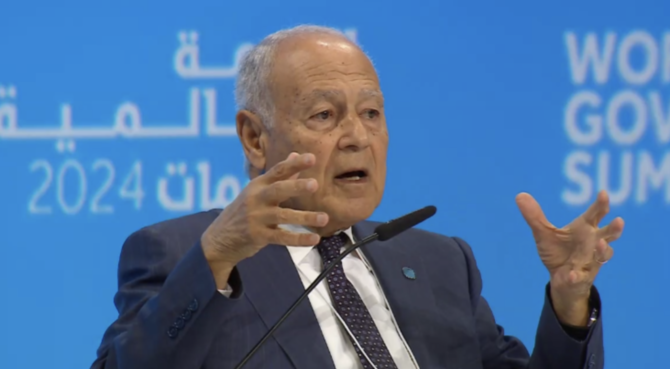LONDON: The displacement of the Palestinian population from the occupied territories by Israeli forces would lead to confrontation “for the next 1,000 years,” the secretary-general of the Arab League said on Tuesday.
Speaking at the World Governments Summit in Dubai, Ahmed Aboul Gheit also reiterated his warning of the “dangerous consequences” of Israel’s ongoing assault on Rafah.
“The (Israeli) occupation’s intentions to impose the reality of displacement on hundreds of thousands of Palestinians, who have taken refuge in Rafah as a last resort from indiscriminate attacks on civilians, is an open and completely rejected plan; it entails serious threats to regional stability,” he added.
Hundreds of thousands of Palestinians have fled to Rafah since the Israeli bombardment of the Gaza Strip began, which was in response to Oct. 7 Hamas attacks on Israel, during which 1,200 people were killed.
Israel’s military action in Gaza has claimed more than 28,000 Palestinian lives, according to the Hamas-run health authorities in the enclave.
An Israeli rescue operation on Monday freed two Israeli-Argentine hostages held by Hamas militants in Rafah, but supporting airstrikes killed nearly 70 Palestinians, it was reported on Tuesday.
Aboul Gheit pointed out that it was imperative that the US and the Western bloc asked Israel to stop its attacks and called for an immediate ceasefire in Gaza, otherwise there would be an “explosion” of violence in the Middle East.
Discussing the possibility of a two-state solution with an independent Palestinian state, he noted that the scenario would only be possible when Israel “dismantled its illegal settlements built on Palestinian land.”
He said that Israel’s actions — spurred on by far-right elements in its government — in Gaza and its treatment of Palestinians had become a threat to the continuity of the peace agreements it signed with its neighbors, especially with countries such as Egypt and Jordan.
On what he described as the impossibility of crushing Palestinian resistance, Aboul Gheit said: “Resistance cannot be eliminated, and this is a lesson that must be learned from history.”
And on the impact of Iran and its proxies on regional security, he pointed out that Tehran’s nuclear program had “provoked the West.”
Fellow panellist, Gulf Cooperation Council Secretary-General Jasem Al-Budaiwi, said the best way to deal with regional threats was through dialogue.
He noted that GCC countries had a unified approach to dealing with challenges in the Middle East region, not just with Iran but also ending wars in Yemen and Syria and “helping our brothers in Lebanon,” which could only be achieved with openness and discussion.
He added that Saudi Arabia’s normalization deal with Tehran in March last year had taken GCC-Iranian relations to “a new level,” and would have a hugely positive impact on regional stability in the future.


























